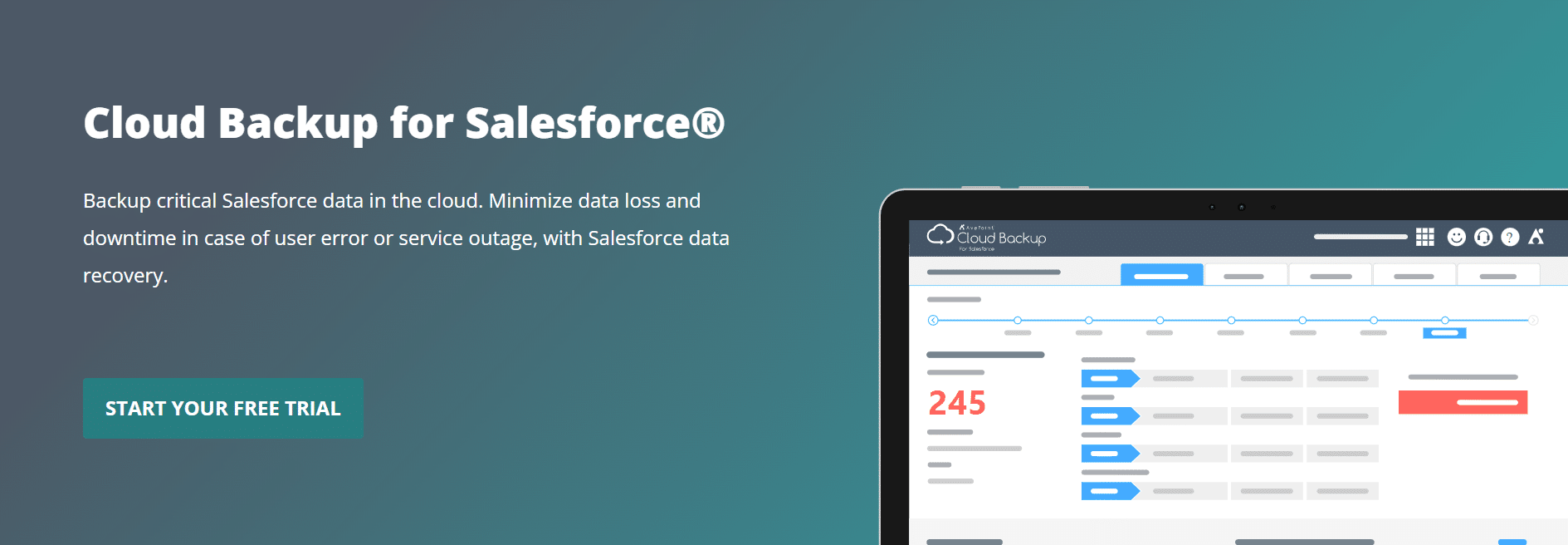As the number of cyberattacks and data breaches continues to rise, with a 68% increase in data breaches from 2020 to 2021 and another 14% increase from 2021 to 2022, people want to know their information is safe and secure. This is especially true among corporations and organizations.
If you’re a user of CRMs like Salesforce, you would understand the importance of Salesforce data security. These platforms are often a treasure trove of personal and sensitive information — from client contact information to financial records — so businesses using these platforms must take precautions to secure their customers’ information.
This also prompted the creation of policies from various regulatory bodies around the globe like the General Data Protection Regulation (GDPR), the Financial Industry Regulatory Authority (FINRA), and the California Consumer Privacy Act (CCPA). For a company that uses Salesforce, this means you should be able to take Salesforce trust and compliance into account in your daily operations.
Organizations can secure their data and meet compliance requirements by adopting a compliant data protection strategy. In this blog, we’ll discuss how you can maintain Salesforce data security and uncover the top compliance concerns related to Salesforce data.
How to Stay Compliant with Salesforce Data Protection
A compliant data protection strategy protects both your content and the data within that content. It prioritizes privacy and confidentiality in addition to backup and recovery, ensuring you hold on to the data you need – nothing more, nothing less – and enabling you to validate this fact.
If you’re just getting started in creating a compliance strategy, this can feel challenging. Adopting compliant data protection is a complete mindset shift from traditional backup methods. Why? The demand for more stringent privacy measures makes it insufficient to simply have a redundant copy of your important information sitting in a cloud somewhere.
Fortunately, you are not facing these challenges alone. A good backup provider should not only offer a solution that streamlines or automates these challenges, but also provides expertise in any rules you face that will help you navigate the regulatory waters.
Navigating Salesforce Data Security: Top 3 Essentials
Let’s look at three of the top concerns for organizations adopting compliant data protection and how a good backup provider can help you address them.
1. Understanding Where Your Data Lives
Whether facing data sovereignty or data residency regulations, it’s never been more crucial to know exactly where your data lives.
You may be used to backing up your data onto servers in your office, and now you need to coordinate data in multiple data centers around the world.
This can easily be accomplished if you find a backup provider that can customize where your data is stored. Whether you have your own containers already or need someone to manage what data can be stored where, a backup provider that offers compliant data protection should have capabilities that meet your needs.
For example, AvePoint Cloud Backup for Salesforce® is built on Azure, meaning the entirety of Azure’s global data centers are at your disposal and you can dictate exactly where specific data is stored. This can also enhance your Salesforce trust and compliance, and in effect, assist with your business continuity. After all, many disaster recovery experts recommend businesses store their backups in a location independent of their production org.
For those who already have the storage they like, such as Amazon S3, Dropbox, or your own Blob Storage, you can bring your own storage and still benefit from AvePoint’s expertise.
2. Retaining Only What You Need
Some regulations dictate a certain timeframe that you can hold on to data. For example, FINRA requires financial institutions to retain certain types of customer data and communications for a minimum of six years. In a scenario like this, you should be geared with Salesforce data archiving best practices to assist with regulatory compliance. This ensures that you can easily access and pull up data when needed for compliance purposes.
But not all regulations are the same. As opposed to FINRA, one of the seven principles of GDPR is storage limitations, stating you should only hold on to personal data “for as long as you need it.” This means you must delete a customer’s credit card or social security number after using it for its intended purpose.
On the surface, this may seem like an easy, manual process, but it can get difficult quickly as you scale your operations and processes become more complex. What’s more, you need to not only sponge that information from your production org, but also from any backups or sandboxes; if you’re performing multiple backups a day, this can get out of control quickly.
The best solution is to invest in a backup provider that automates data cleanup. For example, AvePoint Cloud Backup for Salesforce® has an entire module dedicated to data cleanup. Within the solution, you can identify what pieces in the record you want to cleanse – such as a customer’s address – and then apply it against the records and the backup sets, ensuring you are purging data from both the production org and backups. The solution also allows you to run reports as a reassurance that the information is deleted, validating the fact that your org is compliant.
This can be helpful in other situations as well, such as if other regulations like the Right to be Forgotten apply to you, as this also requires you to have a method to delete personal information if requested.
3. Responding to Data Inquiries
Both GDPR and CCPA as well as the Freedom of Information Act (FOIA) give consumers the right to request copies of any personal information that an organization may have, giving individuals transparency and full control over their own data.
For example, GDPR’s right to data portability requires organizations to deliver any personal data upon request in a “structured, commonly used and machine-readable format.” A FOIA request allows the public to request access to records from any federal agency.
Cloud Backup for Salesforce® offers search and export functions that simplify information-gathering requests such as GDPR, CCPA, and FOI. Using the solution, you can search by keyword or upload a CSV file to identify records from the backup data and export reports to respond to the data inquiries. Then, should the individual request it, you can easily purge individual fields or entire records with Cloud Backup’s data cleanup module.
Bonus: For any US federal agencies looking to streamline FOIA requests and for more compliant data protection, Cloud Backup is a Salesforce FedRAMP (moderate) authorized backup solution, an indication that its security controls have been rigorously evaluated and verified for use.
Building a Proactive Compliant Data Protection Approach
The burgeoning number of data breach instances among companies has led to more stringent regulatory requirements. Because of this, you must adopt stricter measures to ensure Salesforce trust and compliance. On top of ensuring Salesforce data security, it’s important to note that sensitive data in any collaboration platform (i.e., Microsoft 365, Google Workspace, Dropbox, etc.) must be protected to avoid data breaches and unauthorized access to information.
So, be forward-thinking when building your Salesforce data security strategy. Consider your IT infrastructure; ask yourself, what SaaS applications do you use, or will you use in the future that may face compliance issues? Partnering with a provider that offers compliant data protection across multiple SaaS applications will prevent you from the costly and tedious process of switching providers in the future.
Think about what requirements you face now and what you might face in the future as your organization expands or regulations increase. A provider that has access to global data centers and expertise in international regulations will help you scale with ease.
This proactive approach will not only help you meet regulations for today but set you up for success in the future.
Become Salesforce Data Compliant Through AvePoint Cloud Backup
Backup is a critical component of privacy compliance. As a leader in multi-cloud backup, AvePoint Cloud Backup for Salesforce® is the answer to your data protection compliance concerns.
Cloud Backup for Salesforce® provides:
- Automatic daily backups
- Comprehensive, granular restore capabilities (including data and metadata)
- Secure encryption through Microsoft Azure
- Search and export functions that simplify information-gathering requests
Cloud Backup for Salesforce® can offer you a safe, compliant Salesforce environment. Enjoy a more efficient way of protecting your Salesforce data.
Cloud Backup for Salesforce® is a solution that helps data backup and recovery across all industries. As a bonus, it is a FedRAMP (moderate) authorized solution, which would highly benefit users in the public sector.



